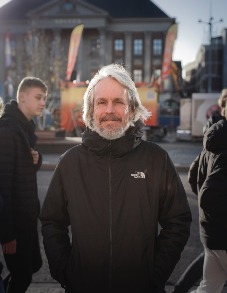An insight into Dr Marc Pauly's 'Philosophy of Nature' honours course

Can you tell us a bit about yourself?
My name is Marc Pauly. I’m an assistant professor at the Faculty of Philosophy and also the head of the Knowledge Center of Philosophy (Kenniscentrum FIlosofie), the Science Shop of the Faculty. The Science Shop focuses on applying philosophical research in societal contexts in collaboration with community partners. I’ve worked at the University of Groningen for over 15 years. Before that, I worked in the United States, England, and France. For the past three years, I’ve been teaching the Philosophy of Nature Honours course at the Honours College.
What makes the Honours Programme special?
The Honours Programme is unique for its interdisciplinary, academic freedom, and innovative approach to teaching and learning. Unlike traditional education, it allows lecturers to design innovative courses and students have the freedom to create their own projects for the Atelier, which they later present at the Honours Festival. Close collaboration between teachers and students—through the broadening module, Summer School, and Atelier—fosters deep engagement and stronger teacher-student connections, and Honours lecturers are inspired by their students’ perspectives and ideas. The diversity of student backgrounds and disciplines enriches discussions and sparks intellectual curiosity, creativity, and personal growth. Perhaps the true essence of learning is more about the connection between teachers and students, the enthusiasm they share, and the freedom to explore ideas together in an interdisciplinary learning community. I think the Honours College could be more of a model for how we should restructure education more generally within the faculties. For example, for more students to have the opportunity to work on creative projects like in the Atelier or to go on field trips.
Can you tell us about the Philosophy of Nature Honours course, including the Summer School and Atelier?
The Philosophy of Nature course explores the fundamental relationship between humans and nature—addressing environmental issues, philosophical perspectives, and questions such as how nature is understood or politically represented. During the five-day Summer School in Drenthe, students stay at the NIVON House for Nature Friends hostel, visit local reserves to observe and discuss issues like whether to feed animals during harsh winters or let nature take its course, and reflect on how the experiences of the summer school affect them. They also learn about the forest movement’s experiential approaches to nature—such as tracking animals, identifying plants, and connecting more deeply with the natural world. For many international Honours students, discovering the northern Dutch landscape is an eye-opening experience. The Atelier allows them to creatively engage with course themes through projects presented at the Honours Festival. Past projects have included creating storybooks that examine cultural views of nature and other artistic interpretations, and the discussions about wolves in the Netherlands—where ecologists welcome the growing wolf population for ecological balance, while farmers express concerns about livestock being attacked.
How does the interdisciplinary nature of this course enrich Honours students’ learning?
Honours students gain both academic and personal growth from the interdisciplinary and hands-on nature of this course. For example, biology students contribute their practical understanding of scientific inquiry. Similarly, students from other fields, such as history or art, offer perspectives I wouldn’t have considered. A memorable example was a history student who discussed medieval European animal trials, providing historical context for debates about animals’ moral and legal status today. These exchanges enrich both the students’ and my own understanding. In terms of personal development, students often describe the course as deeply rewarding. They step outside their comfort zones, develop creative skills, and pursue projects driven by their own curiosity. For me, part of the joy of teaching lies in being surprised by your students, rather than expecting them to simply do what you prescribe. This fosters a learning environment built on initiative, reflection, and collaborative exploration.
What connections have you established with partners outside the University?
We collaborate with local and regional partners, including the forest movement, an ecologist from the Province of Drenthe, and staff at nearby nature reserves that we visit for the Summer School. For example, one year an ecologist joined us to discuss the political and ecological debates about the reintroduction of wolves, giving students real-world insights into complex environmental issues. We’ve also worked with local sheep herders, allowing students to hear directly from people affected by these ecological dynamics.
More news
-
15 September 2025
Successful visit to the UG by Rector of Institut Teknologi Bandung
